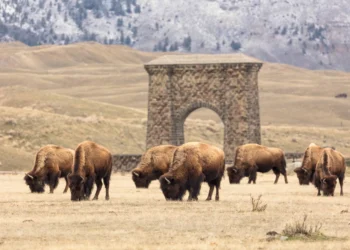By Anne Cantrell MSU NEWS SERVICE
BOZEMAN — A team of researchers from Montana State University is one step closer to helping interested individuals make more efficient use of food waste after wrapping up a collaboration with a dozen Bozeman households.
The researchers are studying the potential to use anaerobic digestion for processing household food waste. Anaerobic digestion is a process through which microorganisms break down organic materials, such as food scraps, without oxygen. The process produces biogas, which can be captured and used for energy production, and digestate, a nutrient-rich fertilizer.
Roland Ebel, assistant research professor in the Department of Health and Human Development who is leading the project, explained that the process involves putting accumulated food scraps in a prepared, airtight container. Specific bacteria, called inoculants, then transform the scraps into a nutrient-dense biofertilizer in four to six weeks.
Ebel and his team aim to learn more about the effectiveness and usability of special containers called digesters to break down food waste into biofertilizer. The work is supported by a $299,881 grant from the Environmental Protection Agency and another project on anaerobic digestion for agricultural waste has also been supported by the USDA’s National Institute of Food and Agriculture through its Western Sustainable Agriculture and Research Education program.
In addition to Ebel, team members include Fabian Menalled, professor in the Department of Land Resources and Environmental Sciences; Tim Seipel, assistant research professor in the Department of Land Resources and Environmental Sciences; Jed Eberly with the Central Agricultural Research Center; Gracelyn Abel, an undergraduate student in the sustainable food and bioenergy systems program; and graduate research assistant Elizabeth Reiva, who is a master’s student in the Department of Land Resources and Environmental Sciences.
As part of the project, and in collaboration with the city of Bozeman, the team recruited 12 local households to collect their food waste for a year. In 2021, members of the research team picked up the households’ food waste weekly and sorted through the items, noting the different nutrient groups into which the waste was categorized. Ebel said the team sorted the nutrient compounds because they determine how fertile the end product will be and how quickly it can be digested.
At the beginning of this year, the team delivered digesters to the households in Bozeman and taught the participants how to use them. The research team used raw fertilizer from a dairy farmer in Churchill as the biodigesters’ inoculant. Then, in June, the participants began regularly depositing their organic waste into the digesters. Throughout the summer and early fall, the project team collected samples of the generated digestate, which can be used as a liquid fertilizer.
The participating households were divided into two groups: Six of them received a simpler system (which Ebel and Eberly designed), and the rest received a more sophisticated commercial digester. In addition to the 12 household digesters, the researchers had three digesters on the MSU campus to experiment with different mixes of food. The project team collected the digestate and tested the biogas generated by the digesters on campus. The produced gas – mostly methane – was flammable, which was a highly desirable result, Ebel said.
“We could heat our tea with gas produced by our food waste,” he noted.
Roland said anaerobic digestion sounds similar to composting, but there are important differences. Composting is an excellent way of recycling organic waste such as lawn clippings, he said, but it requires more space and isn’t as efficient for processing energy- and nutrient-dense food residues. Also, not every household has a garden available for composting. Finally, anaerobic digestion generates two products, biogas and a fertilizer, whereas composting only produces fertilizer.
He added that the costs of anaerobic digestion in biodigesters is reasonable, with the model they created for small households costing approximately $50.
The team concluded its work with local households this fall and is now working to process and analyze the data. Among the questions the team will use the data to address include the quality of the fertilizer from the two household groups, the effectiveness of the two designs and the usability of the two digesters. In addition, the project team currently tests the liquid fertilizer on cabbage, bush beans and spinach in the greenhouse.
Ebel and members of the research team said that it’s important to address how to deal with food waste in a sustainable way, and they are hopeful that the research results will show the biodigester technology is helpful.
“People have sustainability concerns, and they also want to get rid of food waste and fertilize their gardens,” Ebel said. “We think this may be a way to meet all those needs.”
“Most people have a need for a fertilizer,” Seipel added. “There is definitely an application for this product.”
Ebel also pointed out that converting food waste into fertilizer diverts waste from the dump, and – because food waste generates methane as it rots – converting food waste into fertilizer and making use of the biogas also prevents the emission of unused greenhouse gas. Ebel also noted that using biodigesters could ultimately help increase energy independence. A small digester like the ones tested in the Bozeman households delivers enough gas to feed the kitchen stove of a four-person household, he said. Larger models can run entire households and generate additional electricity for sale, he added.
“The potential of this technology is tremendous, and there is also a lot of interest in it,” Ebel said. “We’re very excited to learn more about its many adaptable uses.”
Alison Harmon, MSU vice president of research and economic development, said the work is important and aligned with MSU’s mission.
“Fostering food and fuel security and promoting sustainable food systems is identified as one of the ‘grand challenges’ in our university’s strategic plan. This interdisciplinary project has great potential, and I am excited to learn more about the results.”
Ebel expects initial results from the project to be available later this winter.A video series the research team has created about anaerobic digestion is available at youtube.com/watch?v=J3HzxB066l4&list=PLAIkOOshMfC5ricnAqvTS722peRhXgXuC.














